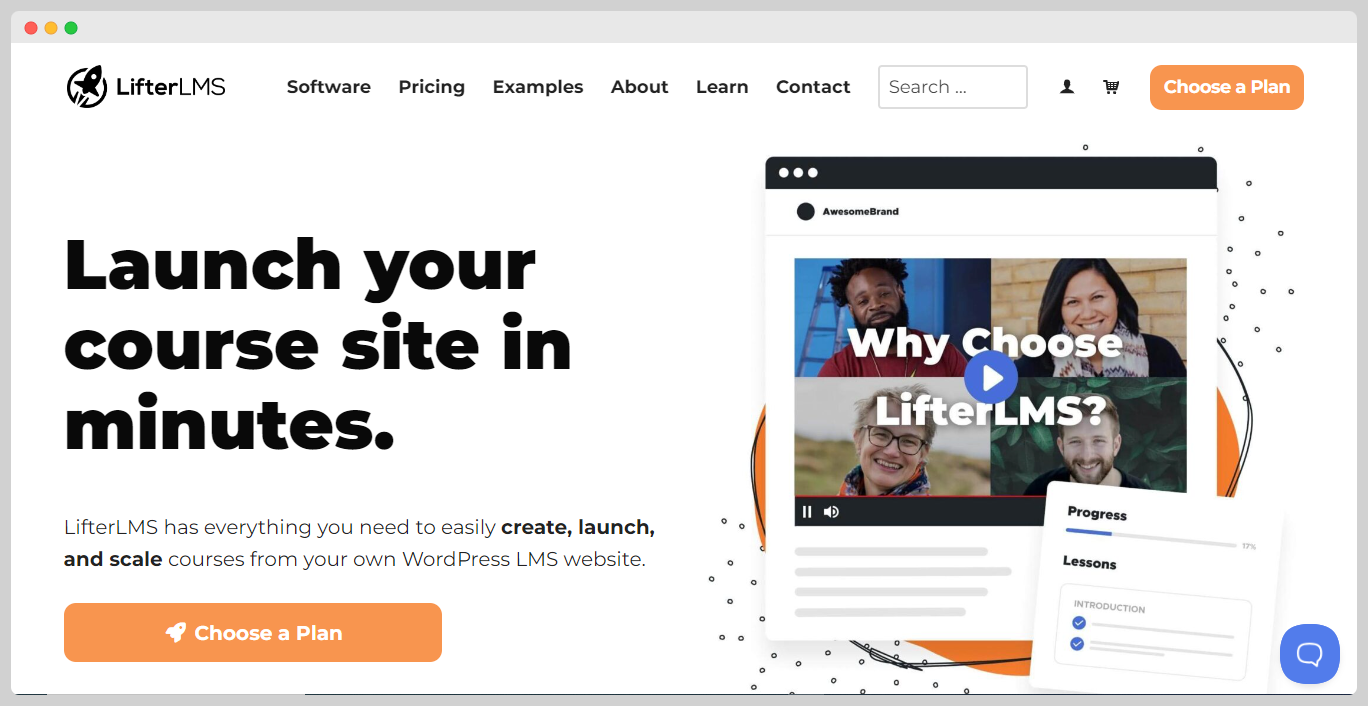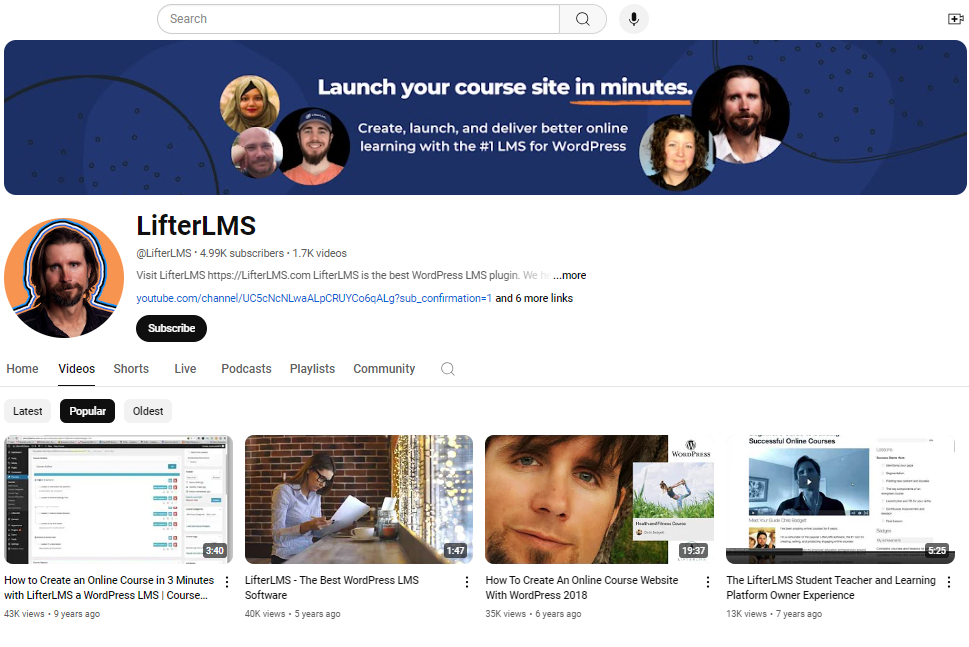How Two Founders Bootstrapped LifterLMS to $750K ARR in Revenue
Who is Chris Badgett?
Chris Badgett, co-founder of LifterLMS, grew up in North Carolina, studied Anthropology, Sustainable Development, and Philosophy, and spent nearly a decade running sled dogs in Alaska before diving into WordPress development in 2008.
What problem does LifterLMS solve?
LifterLMS eliminates the complication of piecing together multiple plugins by offering a comprehensive, all-in-one learning management system, making it easier for creators to build, market, and sell online courses on WordPress.
Users avoid the technical headaches of integrating various tools, thereby streamlining the process of course creation and management seamlessly.

How did Chris come up with the idea for LifterLMS?
Chris Badgett noticed a problem during his time running a WordPress agency where they built high-end training-based membership sites from scratch. There wasn't an all-in-one solution that combined membership, LMS, eCommerce, and gamification functionalities. This problem became clear from his personal experience working with clients who needed comprehensive and integrated learning management features.
To validate the idea, Chris proposed the concept to his existing clients and received encouraging feedback, leading to the development of LifterLMS. They started with pre-sales and got 42 customers, including some high-end agency clients, which further validated the need. Balancing resources between client work and product development was a challenge, but they managed by reinvesting service profits into the plugin.
The key lesson Chris learned was the importance of validating the idea with real customers and being willing to invest heavily in development while keeping a close connection with the target audience's needs. This approach ensured that they were solving a genuine problem effectively.
How did Chris build the initial version of LifterLMS?
Chris Badgett and his team focused LifterLMS's development on creating a comprehensive all-in-one learning management system (LMS) within the WordPress ecosystem. They used WordPress as the foundational technology, incorporating WooCommerce to handle eCommerce aspects. Early development cycles relied on creating tangible solutions for existing WordPress agency clients' needs, allowing for iterative feedback and refinements.
The team initially built LifterLMS using local development environments and leveraging tools like GitHub for version control. The first prototype featured essential LMS functionalities such as membership management, course organization, and basic engagement tools like certificates and badges, assembled in a sandbox environment before extensive client testing. This MVP (minimum viable product) took roughly a year and a half to get from concept to public launch.
Building LifterLMS required overcoming significant challenges, including bootstrapping the project financially and balancing resources between the service agency work and product development. For example, the founders had to constantly reinvest profits and manage client projects while evolving the plugin, requiring significant personal sacrifice and tight budgeting.
How did Chris launch LifterLMS and get initial traction?
Initial Agency Clients
Before fully launching LifterLMS, Chris Badgett and his team had an advantage: they were already running a WordPress agency focusing on high-end training-based membership sites. Their early clients from this agency became the first users of LifterLMS.
Why it worked: This initial customer base was essential because these clients were already familiar with the team and the need for a more comprehensive learning management system. They trusted the team and were in the right target market for the product. Having these clients allowed Chris to validate the product and refine it before a larger public launch.
Metrics: - 42 customers in the first week. - These initial clients were instrumental in providing feedback and proving the concept.
YouTube Tutorials
Chris leveraged YouTube as a significant way to get the word out in the early days. He created videos on building WordPress sites from scratch, and these videos garnered attention from potential customers who needed help setting up their own LMS.
Why it worked: The YouTube tutorials showcased Chris's expertise and provided value upfront, establishing trust. People who saw the videos and found them helpful naturally reached out for more complex services or signed up for LifterLMS.
Metrics: - The YouTube videos drove significant traffic to their website, leading to early inquiries and conversions. - The approach established a consistent referral engine as satisfied viewers shared the content.
WordCamps and Conferences
Attending, sponsoring, and organizing WordCamps (WordPress community events) was another tactic used by Chris and his team. These events helped them connect with potential users directly within the WordPress community, building relationships and trust.
Why it worked: Being physically present and engaged in the community allowed for authentic connections and word-of-mouth referrals. WordCamps provided a platform to demonstrate LifterLMS in live settings and gain visibility among an audience actively seeking WordPress solutions.
Metrics: - Significant increase in website traffic and inquiries following these events. - Built a network of WordPress experts and agency owners who became advocates or users of LifterLMS.
These tactics successfully garnered the initial user base for LifterLMS, setting the stage for organic growth and refinement of their product.
What was the growth strategy for LifterLMS and how did they scale?
YouTube
Chris Badgett created YouTube videos to teach viewers how to build WordPress sites from scratch. These instructional videos garnered a lot of views, which led directly to potential clients reaching out and asking him to build their sites.

Why it worked: YouTube’s vast audience and visual format made it an effective channel for showing expertise and simplifying complex technical concepts. By providing valuable content, Chris was able to establish trust and attract clients who preferred to hire him instead of doing it themselves.
WordPress Community Involvement
Chris actively engaged with the WordPress community by attending, sponsoring, and organizing WordCamp events. This enabled him to build relationships within this massive community.
Why it worked: Being involved in the WordPress community helped LifterLMS gain visibility and credibility. WordCamps provided opportunities to connect with like-minded individuals and potential customers who are already inclined to use WordPress plugins.
Partnerships and Integrations
LifterLMS formed a partnership with WP Engine, a popular WordPress hosting provider. This partnership includes having LifterLMS pre-installed in all WP Engine accounts, making it easy for users to start using the plugin right away.
Why it worked: This integration reduced friction for new users by streamlining the setup process. It also leveraged WP Engine's existing customer base, offering a direct channel to reach potential LifterLMS users.
Freemium Model
LifterLMS adopted a freemium model where the core plugin is free, with paid add-ons available for advanced features. This allowed users to start for free and upgrade as they needed more functionalities.
Why it worked: The freemium model made it accessible to a wide range of users, lowering the barrier to entry. Users could test the basic features without financial commitment, leading to higher adoption rates. As they needed more, they could easily transition to paid add-ons, creating a natural upsell pathway.
What's the pricing strategy for LifterLMS?
LifterLMS offers a free core plugin, with premium add-ons starting at $120 per year, providing a mix of freemium and paid features.
What were the biggest lessons learned from building LifterLMS?
- Resource Management is Crucial: Bootstrapping a business means you have to carefully manage and reinvest your profits. LifterLMS redirected resources from their agency to their software development to survive and grow.
- The Power of Team Diversity: Chris Badgett credits much of LifterLMS’s success to the complementary skill sets of his co-founder Thomas Levy. Diverse expertise in a team can drive a company forward more effectively than an individual might on their own.
- Resilience Pays Off: Despite the difficulties and slow initial growth, perseverance helped LifterLMS thrive. Chris emphasizes that many months in the red can be a part of the journey before achieving profitability.
- Engage with the Community: Being a part of the WordPress community through events like WordCamps and building relationships helped raise LifterLMS’s profile and created valuable networking opportunities.
- Customer-Centric Adaptation: LifterLMS listened to their users and continuously integrated solutions to meet evolving needs, from high-end agency clients to individual course creators. Listening to and iterating based on user feedback is vital for long-term success.
Discover Similar Business Ideas Like LifterLMS
Boot.dev founder Lane Wagner increased monthly revenue from $3,000 to $26,000 in a year by narrowing his product focus to a learning path for backend development in Python and Go, increasing memberships and marketing organically through sponsored podcasts and SEO.
EntryLevel, an online education platform founded by Ajay Prakash, provides accessible and effective tech education through cohort-based programs that have resulted in training nearly 30,000 people since its launch and generating $40,000 per month, with a unique pricing model allowing 100% refund for those who complete the course.
More about LifterLMS:
Who is the owner of LifterLMS?
Chris Badgett is the founder of LifterLMS.
When did Chris Badgett start LifterLMS?
2014
What is Chris Badgett's net worth?
Chris Badgett's business makes an average of $62.5K/month.
How much money has Chris Badgett made from LifterLMS?
Chris Badgett started the business in 2014, and currently makes an average of $750K/year.

Download the report and join our email newsletter packed with business ideas and money-making opportunities, backed by real-life case studies.

Download the report and join our email newsletter packed with business ideas and money-making opportunities, backed by real-life case studies.

Download the report and join our email newsletter packed with business ideas and money-making opportunities, backed by real-life case studies.

Download the report and join our email newsletter packed with business ideas and money-making opportunities, backed by real-life case studies.

Download the report and join our email newsletter packed with business ideas and money-making opportunities, backed by real-life case studies.

Download the report and join our email newsletter packed with business ideas and money-making opportunities, backed by real-life case studies.

Download the report and join our email newsletter packed with business ideas and money-making opportunities, backed by real-life case studies.

Download the report and join our email newsletter packed with business ideas and money-making opportunities, backed by real-life case studies.



